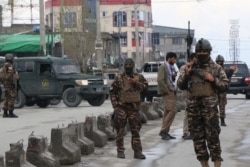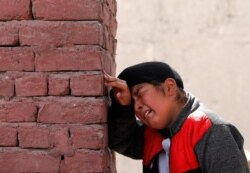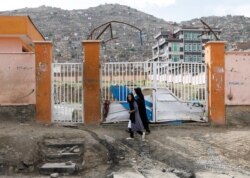Afghan Hindus and Sikhs who moved to India because of deteriorating security in their country are struggling with poor living conditions, and some families have even returned to Afghanistan.
“We are in a situation that we have no option,” said Singh, a 24-year-old Sikh who lost his father, nephew and sister-in-law in a March 2020 attack on a Sikh temple in Kabul’s Shor Bazaar area that killed 25 people. “We cannot go to Afghanistan, and we are stuck in India. We have not been relocated to the U.S. or Canada as we were promised.”
In the aftermath of the attack, which was claimed by the Islamic State, about 200 Hindu and Sikh families left for India — some on special visas — in hopes of being relocated to a third country.
As reported by The Associated Press, members of the Afghan Sikh and Hindu diaspora — most of them based in Canada and Europe — agreed in August to sponsor the exodus to India, which is home to large Hindu and Sikh communities.
Several Canadian legislators also called for a program to grant Afghan Sikhs and Hindus special refugee status, but VOA could not verify whether any were successfully transferred to North America as a result.
Last month about 40 Hindu and Sikh families returned to Afghanistan after staying in India for some nine months.
Singh, who asked that his full name not be used, said that living in India was hard because “one cannot find a job, and we have no financial support.”
Sarmeet Singh, 25, an Afghan Sikh who has been living in India since his father was assassinated in Herat, Afghanistan, two years ago, said the COVID-19 lockdown has made finding work “even more difficult.”
Sarmeet, who has a 4-year-old daughter, said if circumstances don’t change, he’ll be forced to return despite the risk of violence.
“If there are no suicide attacks and targeted killings, I and other Sikhs would return to our home country,” Sarmeet told VOA.
‘Sign of hope’
Once home to thriving Sikh and Hindu minorities, Afghanistan has seen these communities shrink from an estimated 250,000 in the 1980s to less than 1,000 as a result of ongoing warfare and targeted discrimination in the Muslim-majority nation.
The ongoing withdrawal of U.S. and NATO troops, which is already more than 50% complete, has triggered a recent surge of violence.
Dawa Khan Menapal, director of the Kabul-based Government Media and Information Center, said that the Afghan government is committed to providing security to the Hindu and Sikh communities.
“We have addressed their concerns. We have taken measures for their safety,” Menapal said, adding that some Hindu and Sikh families have recently returned to Afghanistan.
Asadullah Yusufi, a commissioner at Afghanistan’s Independent Human Rights Commission, said that the return of dozens of Hindu and Sikh families to Afghanistan is a “sign of hope” for a return to normalcy, but concerns exist about insecurity in the country and a “surge in civilian casualties, particularly of the religious minorities.”
Human Rights Watch said in March that insurgent groups in Afghanistan have increased attacks against minorities.
Last month, a bombing outside a high school west of Kabul, where mainly Hazara Shiite Muslim minority live, killed at least 80 people, mostly schoolgirls, and injured scores. No group has taken responsibility for the attack.
Afghan officials blamed the Taliban, who have rejected any involvement in that particular bombing despite increasing attacks in areas controlled by the Afghan government.
Peace talks
Meanwhile, the Taliban said Wednesday that its negotiators met with their Afghan government counterparts on Tuesday in Doha.
Mohammad Naeem, the spokesperson for the Taliban’s political office in Doha, Qatar, tweeted that the teams discussed “accelerating the Afghan negotiations and the topics of the [intra-Afghan talks] agenda.”
No progress has been reported in the intra-Afghan talks that started in September 12 in Doha.
Basant Singh, 55, who has been living for the past 27 years in India, said that he is “still hopeful for a peaceful resolution of the war in Afghanistan.”
Basant Singh, who fled his home in the eastern city of Khost in 1991 and left Afghanistan in 1992 because of the civil war, said that he hopes “peace would come to Afghanistan so that all [Hindus and Sikhs] would return to their country and live in peace and happiness.”
“I want to spend the rest of my life there,” he said.
VOA’s Afghanistan Service reporter Ibrahim Rahimi contributed to this story from Khost.








